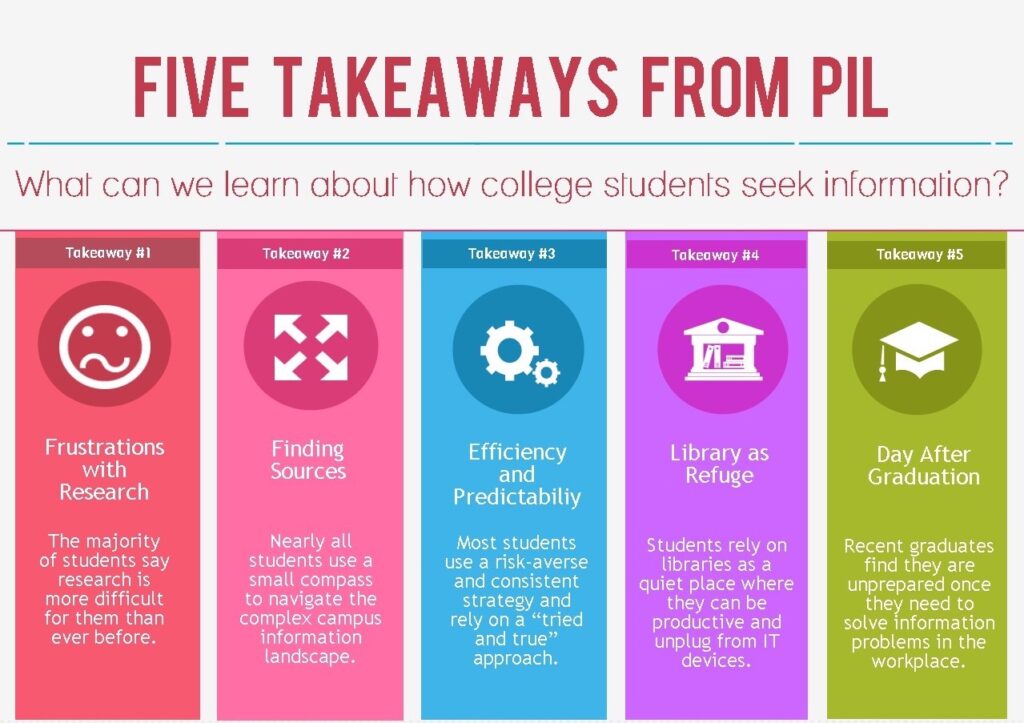Table of contents
Abstract
A report about college students and their information-seeking strategies and research difficulties, including findings from 8,353 survey respondents from college students on 25 campuses distributed across the U.S. in spring of 2010, as part of Project Information Literacy. Respondents reported taking little at face value and were frequent evaluators of Web and library sources used for course work, and to a lesser extent, of Web content for personal use. Most respondents turned to friends and family when asking for help with evaluating information for personal use and instructors when evaluating information for course research. Respondents reported using a repertoire of research techniques—mostly for writing papers—for completing one research assignment to the next, though few respondents reported using Web 2.0 applications for collaborating on assignments. Even
though most respondents considered themselves adept at finding and evaluating information, especially when it was retrieved from the Web, students reported difficulties getting started with research assignments and determining the nature and scope of what was required of them. Overall, the findings suggest students use an information-seeking and research strategy driven by efficiency and predictability for managing and controlling all of the information available to them on college campuses, though conducting comprehensive research and learning something new is important to most, along with passing the course and the grade received. Recommendations are included for how campus-wide stakeholders—faculty, librarians, and higher education administrators—can work together to help inform pedagogies for a new century.
Preferred citation format: Alison J. Head and Michael B. Eisenberg (November 1, 2010), Truth be told: How college students evaluate and use information in the digital age, Project Information Literacy Research Institute, https://projectinfolit.org/publications/evaluating-information-study/
Media coverage
“Research chat: Information scientist Alison Head on student habits,” John Wihbey, Journalist’s Resource: A Research Portal and Curated Database, January 26, 2012.
Related PIL resources
- “Project Information Literacy: What can be learned about the information-seeking behavior of today’s college students?” Alison J. Head, Association of College and Research Libraries (ACRL) Proceedings 2013, Chicago: ALA, 2013.
- “Char Booth: A DIY approach to re-imagining libraries,” email interview by Alison Head and Michele Van Hoeck, Project Information Literacy, Smart Talk Interview, no. 16, November 16, 2017, no. 16, September 27, 2013.
- “David Weinberger, “Why networked knowledge makes us smarter than before,” email interview by Alison Head, Project Information Literacy, Smart Talk Interview, no. 11, April 20, 2012.
- “Searching for context: Modeling the information-seeking process of college students in the digital age,” Berkman Center on Internet and Society, Harvard, podcast with Alison Head, January 10, 2012 (1:15 mins.).
- “Lee Rainie: Why new media are becoming your new neighborhood,” Project Information Literacy Smart Talk, no. 7, Lee Rainie, June 8, 2011.
- “How college students use the web to conduct everyday life research,” Alison J. Head and Michael B. Eisenberg, First Monday, April 2011, vol. 16, no. 4.
- Nicholas Carr: The age of perpetual distraction,” email interview by Alison Head, Project Information Literacy, Smart Talk Interview, no. 6, April 4, 2011.
- “Howard Rheingold, “Crap detection 101: Required coursework,” email interview by Alison Head, Project Information Literacy, Smart Talk Interview, no. 5, January 3, 2011.
- “John Palfrey, Rethinking plagiarism in the digital age?” email interview by Alison Head, Project Information Literacy, Smart Talk Interview, no. 3, September 1, 2010.
- “Peter Morville: Search and the paradox of choice,” email interview by Alison Head, Project Information Literacy, Smart Talk Interview, no. 1, June 1, 2010.
- “How today’s college students use wikipedia for course-related research,” Alison J. Head and Michael B. Eisenberg, First Monday, March 2010, Volume 15, Number 3.

The Evaluation Study has a Creative Commons (CC) license of “CC BY-NCSA 4.0.” This license allows others to share, copy, adapt, and build upon the survey data non-commercially, as long as the source — Project Information Literacy — is credited and users license their new creations under the identical terms.

